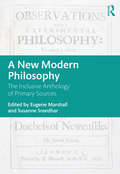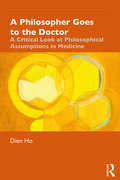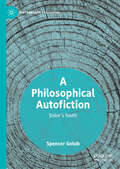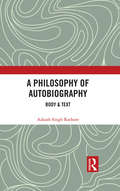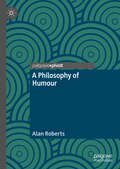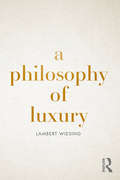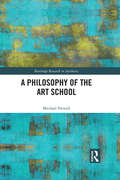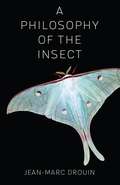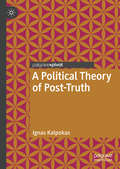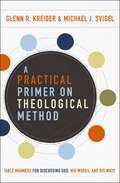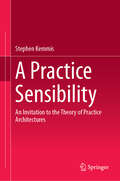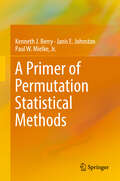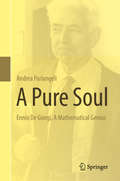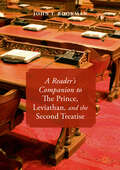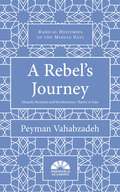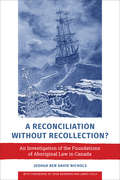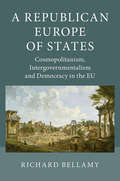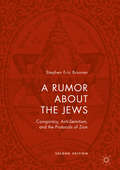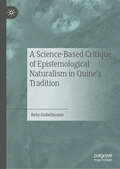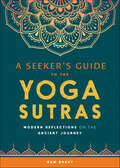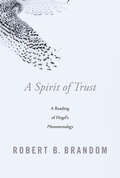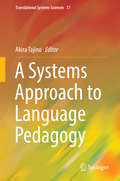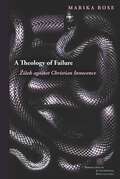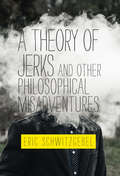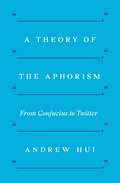- Table View
- List View
A New Modern Philosophy: The Inclusive Anthology of Primary Sources
by Eugene Marshall and Susanne SreedharThe seventeenth and eighteenth centuries are arguably the most important period in philosophy’s history, given that they set a new and broad foundation for subsequent philosophical thought. Over the last decade, however, discontent among instructors has grown with coursebooks’ unwavering focus on the era’s seven most well-known philosophers—all of them white and male—and on their exclusively metaphysical and epistemological concerns. While few dispute the centrality of these figures and the questions they raised, the modern era also included essential contributions from women—like Margaret Cavendish, Elisabeth of Bohemia, Mary Wollstonecraft, and Émilie Du Châtelet—as well as important non-white thinkers, such as Anton Wilhelm Amo, Julien Raimond, and Ottobah Cugoano. At the same time, there has been increasing recognition that moral and political philosophy, philosophy of the natural world, and philosophy of race—also vibrant areas of the seventeenth and eighteenth centuries—need to be better integrated with the standard coverage of metaphysics and epistemology.A New Modern Philosophy: The Inclusive Anthology of Primary Sources addresses—in one volume—these valid criticisms. Weaving together multiple voices and all of the era’s vibrant areas of debate, this volume sets a new agenda for studying modern philosophy. It includes a wide range of readings from 34 thinkers, integrating essential works from all of the canonical writers along with the previously neglected philosophers. Arranged chronologically, editors Eugene Marshall and Susanne Sreedhar provide an introduction for each author that sets the thinker in his or her time period as well as in the longer debates to which the thinker contributed. Study questions and suggestions for further reading conclude each chapter. At the end of the volume, in addition to a comprehensive subject index, the book includes 13 Syllabus Modules, which will help instructors use the book to easily set up different topically structured courses, such as "The Citizen and the State," "Mind and Matter," "Education," "Theories of Perception," or "Metaphysics of Causation." And an eresource offers a wide range of supplemental online resources, including essay assignments, exams, quizzes, student handouts, reading questions, and scholarly articles on teaching the history of philosophy.
A Philosopher Goes to the Doctor: A Critical Look at Philosophical Assumptions in Medicine
by Dien HoThis book sheds light on important philosophical assumptions made by professionals working in clinical and research medicine. In doing so, it aims to make explicit how active philosophy is in medicine and shows how this awareness can result in better and more informed medical research and practice. It examines: what features make something a scientific discipline; the inherent tensions between understanding medicine as a research science and as a healing practice; how the “replication crisis” in medical research asks us to rethink the structure of knowledge production in our modern world; whether explanations have any real scientific values; the uncertainties about probabilistic claims; and whether it is possible for evidence-based medicine to truly be value free. The final chapter argues that the most important question we can ask is not, “How can we separate values from science?” but, “In a democratic society, how can we decide in a politically and morally acceptable way what values should drive science?” Key features: introduces complex philosophical issues in a manner accessible to non-professional academics; critically examines philosophical assumptions made in medicine, providing a better understanding of medicine that can lead to better healthcare; integrates medical examples and historic contexts so as to frame the rationale of philosophical views and provide lively illustrations of how philosophy can impact science and our lives; uses inter-connected chapters to demonstrate that disparate philosophical concepts are deeply related (e.g., it shows how the aims of medicine inform how we should understand theoretical reasoning).
A Philosophical Autofiction: Dolor's Youth (Performance Philosophy)
by Spencer GolubThis is a book about what becomes of the truth when it succumbs to generational memory loss and to the fictions that intervene to cause and fill the gaps. It is a book about the impossibility of writing an autobiography when there is a prepossessing cultural and familial 'we' interfering with the 'I' and an 'I' that does not know itself as a self, except metastatically — as people and characters it has played but not actually been.A highly original combination of close readings and performative autobiography, this book takes performance philosophy to an alternative next step, by having its ideas read back to it by experience, and through assorted fictions. It is a philosophical thought experiment in uncertainty whose literary, theatrical, and cinematic trappings illustrate and finally become what this uncertainty is, the thought experiment having become the life that was, that came before, and that outlives the 'I am'.
A Philosophy of Autobiography: Body & Text
by Aakash Singh RathoreThis book offers intimate readings of a diverse range of global autobiographical literature with an emphasis on the (re)presentation of the physical body. The twelve texts discussed here include philosophical autobiography (Nietzsche), autobiographies of self-experimentation (Gandhi, Mishima, Warhol), literary autobiography (Hemingway, Das) as well as other genres of autobiography, including the graphic novel (Spiegelman, Satrapi), as also documentations of tragedy and injustice and subsequent spiritual overcoming (Ambedkar, Pawar, Angelou, Wiesel). In exploring different literary forms and orientations of the autobiographies, the work remains constantly attuned to the physical body, a focus generally absent from literary criticism and philosophy or study of leading historical personages, with the exception of patches within phenomenological philosophy and feminism. The book delves into how the authors treated here deal with the flesh through their autobiographical writing and in what way they embody the essential relationship between flesh, spirit and word. It analyses some seminal texts such as Ecce Homo, The Story of My Experiments with Truth, Waiting for a Visa, I Know Why the Caged Bird Sings, A Moveable Feast, Night, Baluta, My Story, Sun and Steel, The Philosophy of Andy Warhol, MAUS and Persepolis. Lucid, bold and authoritative, this book will be of great interest to scholars and researchers of philosophy, literature, gender studies, political philosophy, media and popular culture, social exclusion, and race and discrimination studies.
A Philosophy of Humour
by Alan RobertsHumour is a funny thing - everyone knows it but no-one knows what it is. This book addresses the question 'What is humour?' by first untangling the definitions of humour, amusement and funniness before then providing a new theory of humour which draws upon recent research in philosophy, psychology, linguistics and neuroscience. The theory is built up without assuming any prior knowledge and illustrated through humorous examples which are both entertaining and educational for anyone curious about what makes things funny. The book is then an accessible illumination of joking matters from dinner tables to online platforms to comedy clubs.
A Philosophy of Luxury
by Lambert WiesingIn this thought-provoking book Lambert Wiesing asks simply: What is luxury? Drawing on a fascinating range of examples, he argues that luxury is an aesthetic experience. Unlike experience gained via the senses, such as seeing, hearing or tasting, he argues that luxury is achieved by possessing something – an aspect of philosophy that has been largely neglected. As such, luxury becomes a gesture of individual defiance and a refusal to conform to social expectations of restraint. An increasingly rational and goal-oriented ethos in society makes the appeal of luxury grow even stronger. Drawing on the ideas of philosophers such as Immanuel Kant, Friedrich Schiller, Martin Heidegger and the novelist Ernst Jünger, as well as sociologists such as Thorstein Veblen and Theodor Adorno, A Philosophy of Luxury will be of great interest to those in philosophy, art, cultural studies and literature as well as sociology.
A Philosophy of the Art School (Routledge Research in Aesthetics)
by Michael NewallUntil now, research on art schools has been largely occupied with the facts of particular schools and teachers. This book presents a philosophical account of the underlying practices and ideas that have come to shape contemporary art school teaching in the UK, US and Europe. It analyses two models that, hidden beneath the diversity of contemporary artist training, have come to dominate art schools. The first of these is essentially an old approach: a training guided by the artistic values of a single artist-teacher. The second dates from the 1960s, and is based around the group crit, in which diverse voices contribute to an artist’s development. Understanding the underlying principles and possibilities of these two models, which sit together in an uneasy tension, gives new insights into the character of contemporary art school teaching, demonstrating how art schools shape art and artists, how they can be a potent engine of creativity in contemporary culture and how they contribute to artistic research. A Philosophy of the Art School draws on first-hand accounts of art school teaching, and is deeply informed by disciplines ranging from art history and art theory, to the philosophy of art, education and creativity.
A Philosophy of the Insect
by Jean-Marc DrouinThe world of insects is at once beneath our feet and unfathomably alien. Small and innumerable, insects surround and disrupt us even as we scarcely pay them any mind. Insects confront us with the limits of what is imaginable, while at the same time being essential to the everyday functioning of all terrestrial ecosystems.In this book, the philosopher and historian of science Jean-Marc Drouin contends that insects pose a fundamental challenge to philosophy. Exploring the questions of what insects are and what scientific, aesthetic, ethical, and historical relationships they have with humanity, he argues that they force us to reconsider our ideas of the animal and the social. He traces the role that insects have played in language, mythology, literature, entomology, sociobiology, and taxonomy over the centuries. Drouin emphasizes the links between humanistic and scientific approaches—how we have projected human roles onto insects and seen ourselves in insect form. Caught between the animal and plant kingdoms, insects force us to confront and reevaluate our notions of gender, family, society, struggle, the division of labor, social organization, and individual and collective intelligence. A remarkably original and thought-provoking work, A Philosophy of the Insect is an important book for animal studies, environmental ethics, and the history and philosophy of science.
A Political Theory of Post-Truth
by Ignas KalpokasThis book combines political theory with media and communications studies in order to formulate a theory of post-truth, concentrating on the latter’s preconditions, context, and functions in today’s societies. Contrary to the prevalent view of post-truth as primarily manipulative, it is argued that post-truth is, instead, a collusion in which audiences willingly engage with aspirational narratives co-created with the communicators. Meanwhile, the broader meta-framework for post-truth is provided by mediatisation—increasing subjection of a variety of social spheres to media logic and the primacy of media in everyday human activities. Ultimately, post-truth is governed by collective efforts to maximise the pleasure of encountering the world and attempts to set hegemonic benchmarks for such pleasure.
A Practical Primer on Theological Method: Table Manners for Discussing God, His Works, and His Ways
by Glenn R. Kreider Michael J. SvigelA "how-to" manual for doing theology, and a handbook of etiquette for doctrinal discussions with other believers.Around a table sit men and women with distinct roles: The Interpreter, the Theologian, the Virtuous, the Philosopher, the Scientist, the Artist, the Minister, and the Historian. Each is ready to engage in a passionate discussion centered on God, his works, and his ways. Regardless of which role you play at the same table, you're invited. You simply need to pull up a chair and join the conversation. But how? What do you say when you take your seat? Where do you start? What are the "rules" of the dialogue?A Practical Primer on Theological Method will help you answer these questions. This primer is not only a "how-to" manual for doing theology, but a handbook of etiquette for doctrinal discussions with other believers. This popular-level introductory text presents the proper manner, mode, and means of engaging fruitfully in theology.
A Practice Sensibility: An Invitation to the Theory of Practice Architectures
by Stephen KemmisThis book introduces readers to the theory of practice architectures and conveys a way of approaching practice theory through developing a practice sensibility. It shows that, in order to change our practices, we must also change the conditions that make those practices possible. The book draws on everyday life to illustrate how we can see the world by watching it unfold in practices: it argues that life happens in practices. The theory of practice architectures takes the ontological nature of practices seriously by recognising that practices take place in the real world. Consequently, the book offers a new perspective on how practices happen amidst a vast world of happenings; on how we participate in the “happening-ness” of the world through our practices. It invites us to consider whether our practices reproduce or aggravate the contemporary environmental crises confronting the Earth, and whether we can transform our current practices to ameliorate these crises. Given its focus and scope, the book will benefit master’s and doctoral students in social and educational theory, early career researchers, and established researchers new to practice theory.
A Primer of Permutation Statistical Methods
by Kenneth J. Berry Janis E. Johnston Paul W. Mielke, Jr.The primary purpose of this textbook is to introduce the reader to a wide variety of elementary permutation statistical methods. Permutation methods are optimal for small data sets and non-random samples, and are free of distributional assumptions. The book follows the conventional structure of most introductory books on statistical methods, and features chapters on central tendency and variability, one-sample tests, two-sample tests, matched-pairs tests, one-way fully-randomized analysis of variance, one-way randomized-blocks analysis of variance, simple regression and correlation, and the analysis of contingency tables. In addition, it introduces and describes a comparatively new permutation-based, chance-corrected measure of effect size. Because permutation tests and measures are distribution-free, do not assume normality, and do not rely on squared deviations among sample values, they are currently being applied in a wide variety of disciplines. This book presents permutation alternatives to existing classical statistics, and is intended as a textbook for undergraduate statistics courses or graduate courses in the natural, social, and physical sciences, while assuming only an elementary grasp of statistics.
A Pure Soul: Ennio De Giorgi, A Mathematical Genius
by Andrea ParlangeliThis biography illuminates the life of Ennio De Giorgi, a mathematical genius in parallel with John Nash, the Nobel Prize Winner and protagonist of A Beautiful Mind. Beginning with his childhood and early years of research, into his solution of the 19th problem of Hilbert and his professorship, this book pushes beyond De Giorgi’s rich contributions to the mathematics community, to present his work in human rights, including involvement in the fight for Leonid Plyushch’s freedom and the defense of dissident Uruguayan mathematician José Luis Massera. Considered by many to be the greatest Italian analyst of the twentieth century, De Giorgi is described in this volume in full through documents and direct interviews with friends, family, colleagues, and former students.
A Reader’s Companion to The Prince, Leviathan, and the Second Treatise
by John T. BookmanMachiavelli, Hobbes, and Locke each sought a new foundation for political order. This book serves as a reader's companion to Machiavelli’s The Prince, Hobbes’s Leviathan, and Locke’s Second Treatise written for graduate students and scholars seeking a fuller understanding of these classic texts. How do these philosophers respond to perennial questions such as why anyone is ever obligated to obey a government and whether there are any limits to such an obligation. In this book, Bookman begins by sorting out the hermeneutical controversy between textualists and contextualists, offers a chapter-by-chapter commentary on the texts punctuated by questions for the reader’s reflection, and finally suggests a firmer foundation for a theory of political obligation than Hobbes’s and Locke’s consent theories. Also included are bibliographical essays keyed to select bibliographies, providing readers with a wide-ranging, critical review of the secondary literature. Intended to be read alongside the primary work, the work is a full intellectual, critical, and bibliographical history, as well as a fresh examination of three classic texts in political theory and philosophy.
A Rebel's Journey: Mostafa Sho'aiyan and Revolutionary Theory in Iran (Radical Histories of the Middle East)
by Peyman VahabzadehFollowing the 1953 coup that toppled the democratically elected government of Mossadeq and restored the rule of the Shah in Iran, Mostafa Sho&‘aiyan became a key figure on the country&’s militant left. From a life underground he contributed significantly to the study of Iranian history and politics, and developed a unique theory of revolution. A Rebel&’s Journey provides fascinating insights into the life and work of this singular theoretician. Peyman Vahabzadeh sets Sho&‘aiyan&’s thought in the context of his time and place, and explores how his revolutionary theory might contribute to today&’s expanding movements for social justice and liberation.
A Reconciliation without Recollection?: An Investigation of the Foundations of Aboriginal Law in Canada (G - Reference, Information And Interdisciplinary Subjects Ser.)
by Joshua Ben NicholsThe current framework for reconciliation between Indigenous peoples and the Canadian state is based on the Supreme Court of Canada’s acceptance of the Crown’s assertion of sovereignty, legislative power, and underlying title. The basis of this assertion is a long-standing interpretation of Section 91(24) of Canada’s Constitution, which reads it as a plenary grant of power over Indigenous communities and their lands, leading the courts to simply bypass the question of the inherent right of self-government. In A Reconciliation without Recollection, Joshua Ben David Nichols argues that if we are to find a meaningful path toward reconciliation, we will need to address the history of sovereignty without assuming its foundations. Exposing the limitations of the current model, Nichols carefully examines the lines of descent and association that underlie the legal conceptualization of the Aboriginal right to govern. Blending legal analysis with insights drawn from political theory and philosophy, A Reconciliation without Recollection is an ambitious and timely intervention into one of the most pressing concerns in Canada.
A Republican Europe of States: Cosmopolitanism, Intergovernmentalism and Democracy in the EU
by Richard BellamyCombining international political theory and EU studies, Richard Bellamy provides an original account of the democratic legitimacy of international organisations. He proposes a new interpretation of the EU's democratic failings and how they might be addressed. Drawing on the republican theory of freedom as non-domination, Bellamy proposes a way to combine national popular sovereignty with the pursuit of fair and equitable relations of non-domination among states and their citizens. Applying this approach to the EU, Bellamy shows that its democratic failings lie not with the democratic deficit at the EU level but with a democratic disconnect at the member state level. Rather than shifting democratic authority to the European Parliament, this book argues that the EU needs to reconnect with the different 'demoi' of the member states by empowering national parliaments in the EU policy-making process.
A Rumor about the Jews: Reflections On Antisemitism And The Protocols Of The Learned Elders Of Zion
by Stephen Eric BronnerIn its portrayal of Judaism as a worldwide conspiracy dedicated to the destruction of Christian civilization, the Protocols of the Learned Elders of Zion remains one of the most infamous documents ever written. Despite being proven a crude forgery, the pamphlet managed to pervade twentieth-century thinking, often being twisted to suit its handlers' purposes, and to justify the most extreme persecution of the Jews. In A Rumor About the Jews, Stephen Eric Bronner provides a history of this notorious fabrication—one which has renewed salience in a “post truth” society dominated by “fake news"—and explores its influence on right-wing movements throughout the twentieth century and the ongoing appeal of bigotry. This new edition of Bronner's 2000 classic (described by Kirkus as "the best short book on anti-Semitism") expands the arguments of the first edition, bringing the work up to date in a new political context.
A Science-Based Critique of Epistemological Naturalism in Quine’s Tradition
by Reto GubelmannAt the intersection of epistemology, metaphilosophy, and philosophy of science, this exciting new book examines the epistemic limits of empirical science. It makes a unique contribution to research on epistemological naturalism in Quine’s tradition by criticizing the position based on first-order data from empirical psychology and the history of natural science. This way, it meets the naturalist on their own ground not only regarding subject matter, but also regarding their epistemic methods. The book explores the works of a variety of philosophers in the field, including W. V. Quine, Penelope Maddy, Tyler Burge, Stathis Psillos and Howard Sankey. By carefully considering experimental results from behaviourism as well as developmental and perceptual psychology, Gubelmann finds that none of these disciplines can furnish the epistemic means to successfully naturalize the central cognitive preconditions of scientific theorizing. Furthermore, Gubelmann presents novel arguments for the claims that epistemological naturalists are committed to scientific realism, and that they are unable to defend this position. Based on these results, Gubelmann concludes that epistemology is not part of empirical science, which directly contradicts epistemological naturalism.
A Seeker's Guide to the Yoga Sutras: Modern Reflections on the Ancient Journey
by Ram BhaktAncient techniques for thriving in modern timesLiving a healthy, happy, and purposeful life starts with a clear and focused mind. A Seeker's Guide to the Yoga Sutras is an easy introduction to the lessons of Patanjali—graceful, concise explanations of spiritual truths. With short chapters that show you how to adapt these yoga sutras to modern life, you'll be on an accelerated journey of the soul.Need help falling asleep, controlling stress or anger, or just becoming a happier person? These teachings will help you do just that and more. According to this wisdom tradition, the mind, when truly understood, is an extraordinary tool that can take you to a state of total freedom.A Seeker's Guide to the Yoga Sutras includes:A map to peace—Concentration, manifestation, existentialism, and enlightenment are all explained.Daily exercises—Every chapter ends with an exercise or reflection to help you assimilate Patanjali's vision.Ancient tools, ideal for our time—The yoga sutras may date back centuries but feel utterly timely—and deeply necessary—for navigating modern lives.Find out how the teachings of this old practice can have a positive effect on your life with A Seeker's Guide to the Yoga Sutras.
A Spirit of Trust: A Reading of Hegel’s <i>Phenomenology</i>
by Robert B. BrandomIn a new retelling of the romantic rationalist adventure of ideas that is Hegel’s classic The Phenomenology of Spirit, Robert Brandom argues that when our self-conscious recognitive attitudes take Hegel’s radical form of magnanimity and trust, we can overcome a troubled modernity and enter a new age of spirit.
A Systems Approach to Language Pedagogy (Translational Systems Sciences #17)
by Akira TajinoThis volume represents the first attempt in the field of language pedagogy to apply a systems approach to issues in English language education. In the literature of language education, or more specifically, second or foreign language learning and teaching, each topic or issue has often been dealt with independently, and been treated as an isolated item. Taking grammar instruction as an example, grammatical items are often taught in a sequential, step-by-step manner; there has been no “road map” in which the interrelations between the various items are demonstrated. This may be one factor that makes it more difficult for students to learn the language organically. The topics covered in this volume, including language acquisition, pedagogical grammar, and teacher collaboration, are viewed from a holistic perspective. In other words, language pedagogy is approached as a dynamic system of interrelations. In this way, “emergent properties” are expected to manifest. This book is recommended for anyone involved in language pedagogy, including researchers, teachers, and teacher trainers, as well as learners.
A Theology of Failure: Žižek against Christian Innocence (Perspectives in Continental Philosophy)
by Marika RoseEveryone agrees that theology has failed; but the question of how to understand and respond to this failure is complex and contested. Against both the radical orthodox attempt to return to a time before the theology’s failure and the deconstructive theological attempt to open theology up to the hope of a future beyond failure, Rose proposes an account of Christian identity as constituted by, not despite, failure. Understanding failure as central to theology opens up new possibilities for confronting Christianity’s violent and kyriarchal history and abandoning the attempt to discover a pure Christ outside of the grotesque materiality of the church.The Christian mystical tradition begins with Dionysius the Areopagite’s uncomfortable but productive conjunction of Christian theology and Neoplatonism. The tensions generated by this are central to Dionysius’s legacy, visible not only in subsequent theological thought but also in much twentieth century continental philosophy as it seeks to disentangle itself from its Christian ancestry. A Theology of Failure shows how the work of Slavoj Žižek represents an attempt to repeat the original move of Christian mystical theology, bringing together the themes of language, desire, and transcendence not with Neoplatonism but with a materialist account of the world. Tracing these themes through the work of Dionysius and Derrida and through contemporary debates about the gift, violence, and revolution, this book offers a critical theological engagement with Žižek's account of social and political transformation, showing how Žižek's work makes possible a materialist reading of apophatic theology and Christian identity.
A Theory of Jerks and Other Philosophical Misadventures (The\mit Press Ser.)
by Eric SchwitzgebelA collection of quirky, entertaining, and reader-friendly short pieces on philosophical topics that range from a theory of jerks to the ethics of ethicists.Have you ever wondered about why some people are jerks? Asked whether your driverless car should kill you so that others may live? Found a robot adorable? Considered the ethics of professional ethicists? Reflected on the philosophy of hair? In this engaging, entertaining, and enlightening book, Eric Schwitzgebel turns a philosopher's eye on these and other burning questions. In a series of quirky and accessible short pieces that cover a mind-boggling variety of philosophical topics, Schwitzgebel offers incisive takes on matters both small (the consciousness of garden snails) and large (time, space, and causation). A common theme might be the ragged edge of the human intellect, where moral or philosophical reflection begins to turn against itself, lost among doubts and improbable conclusions. The history of philosophy is humbling when we see how badly wrong previous thinkers have been, despite their intellectual skills and confidence. (See, for example, “Kant on Killing Bastards, Masturbation, Organ Donation, Homosexuality, Tyrants, Wives, and Servants.”) Some of the texts resist thematic categorization—thoughts on the philosophical implications of dreidels, the diminishing offensiveness of the most profane profanity, and fatherly optimism—but are no less interesting. Schwitzgebel has selected these pieces from the more than one thousand that have appeared since 2006 in various publications and on his popular blog, The Splintered Mind, revising and updating them for this book. Philosophy has never been this much fun.
A Theory of the Aphorism: From Confucius to Twitter
by Andrew HuiAn engaging look at the aphorism, the shortest literary form, across time, languages, and culturesAphorisms—or philosophical short sayings—appear everywhere, from Confucius to Twitter, the Buddha to the Bible, Heraclitus to Nietzsche. Yet despite this ubiquity, the aphorism is the least studied literary form. What are its origins? How did it develop? How do religious or philosophical movements arise from the enigmatic sayings of charismatic leaders? And why do some of our most celebrated modern philosophers use aphoristic fragments to convey their deepest ideas? In A Theory of the Aphorism, Andrew Hui crisscrosses histories and cultures to answer these questions and more.With clarity and precision, Hui demonstrates how aphorisms—ranging from China, Greece, and biblical antiquity to the European Renaissance and nineteenth century—encompass sweeping and urgent programs of thought. Constructed as literary fragments, aphorisms open new lines of inquiry and horizons of interpretation. In this way, aphorisms have functioned as ancestors, allies, or antagonists to grand systems of philosophy.Encompassing literature, philology, and philosophy, the history of the book and the history of reading, A Theory of the Aphorism invites us to reflect anew on what it means to think deeply about this pithiest of literary forms.
